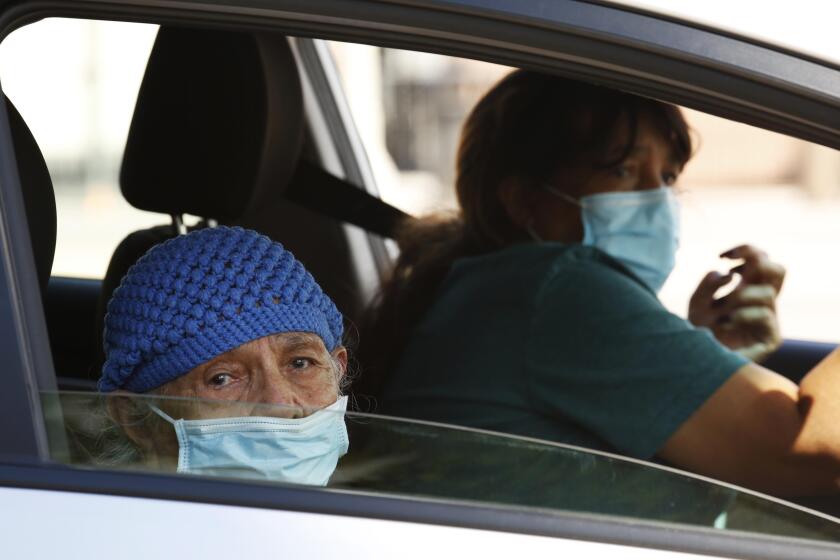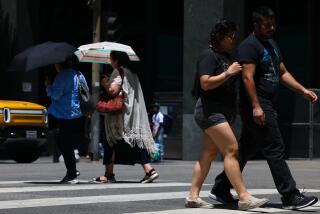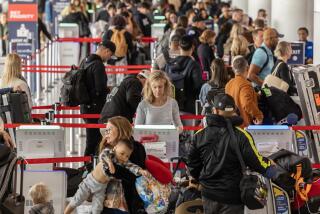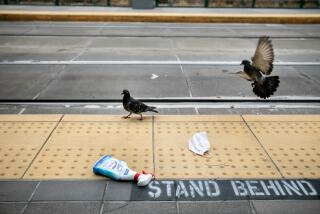Column: Everyone is vulnerable to coronavirus. But seniors still need to take extra precautions
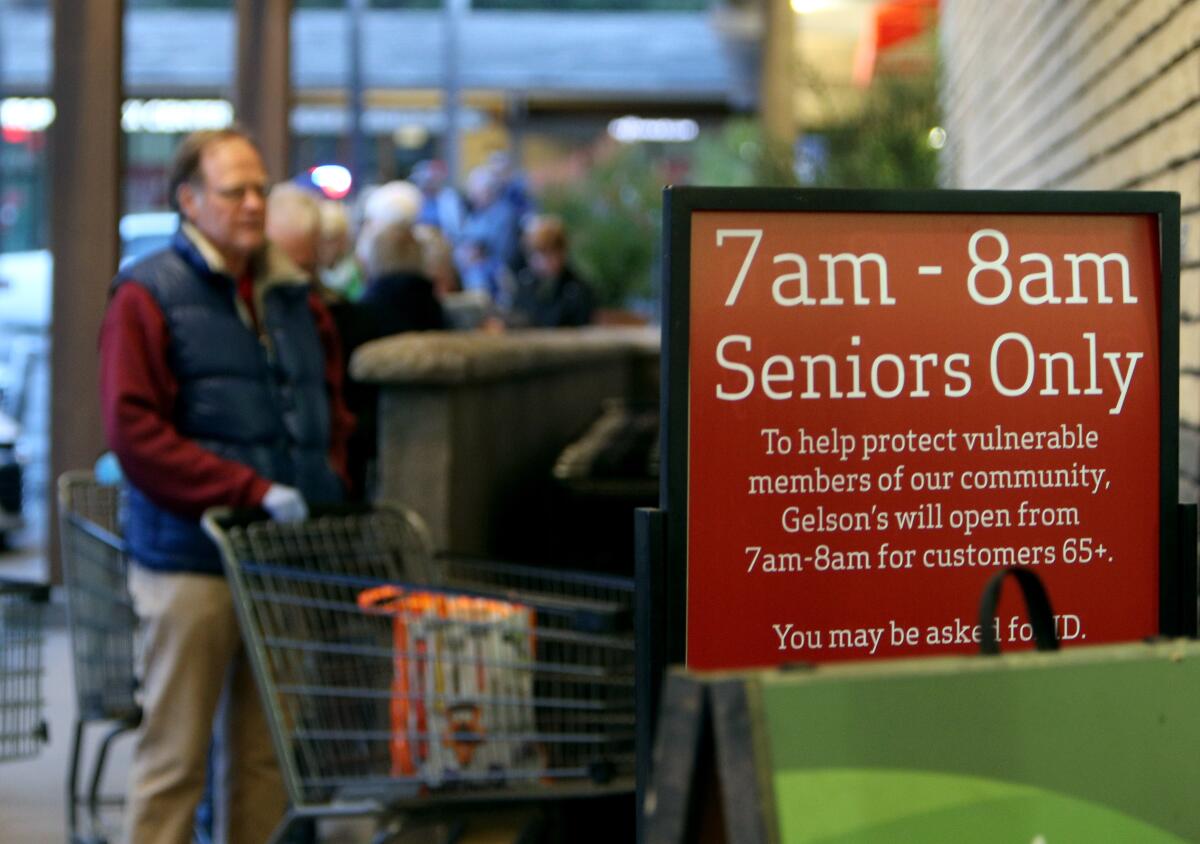
- Share via
SACRAMENTO — Being a card-carrying member of the “most vulnerable” generation — old geezers — my hearing-challenged ears perked up when our governor announced that half of California’s coronavirus victims were between ages 18 and 49.
Seniors 65 and older amounted to less than a quarter of those stricken.
“Young people can and will be impacted by this virus,” Gov. Gavin Newsom told a news briefing last week. His message was clear: Everybody’s vulnerable.
OK, everyone, I thought, stop pointing the finger at us seniors. Maybe we’re not the sickly, defenseless disease-carriers our political leaders and medical experts have suggested. Stop treating us like pariahs who need to be both protected and shunned — any more than younger population groups.
Some state figures tended to prove my point, I thought — at least initially.
As of Saturday, 51% of Californians afflicted with COVID-19 were ages 18 to 49, according to the state Department of Public Health. That’s higher than their 44% share of the state’s population.
People ages 50 to 64 accounted for 26% of the COVID-19 cases. Their slice of the population is only 18%.
But ditto with us old folks. People over 65 made up 22% of the cases, significantly higher than our population share of 15%.
Youngsters 17 and under accounted for a mere 1% of those testing positive. They’re 23% of the population.
Perhaps the most vulnerable: men. They represented 55% of the cases.
Maybe only men should be ordered to stay at home. Forget it.
I called Dr. Louise Aronson, 56, a geriatrics professor at UC San Francisco School of Medicine and author of a bestseller, “Elderhood: Redefining Aging, Transforming Medicine, Reimagining Life.”
Aronson set me straight. By reading the state data, one could conclude that seniors are no more vulnerable to the coronavirus than middle-aged or young people. But that conclusion would be wrong.
Elders and caregivers both need help during the coronavirus pandemic. Here are some tips, as well information of how the stimulus bill affects seniors.
The older we get, she said, the more likely we are to be hit hard by the virus. That’s because our ability to fight it off has gradually diminished over the years. If you’re really old, instead of kicking the disease, the odds are higher that you’d kick the bucket.
Why? Basically, we’re wearing down.
We all know this instinctively, but it’s human nature during dangerous times not to acknowledge the truth and to question it, especially for elders in reasonably good health for our age.
“Old people are more likely to get very sick, need hospitalization, require breathing support and to die,” Aronson told me.
“We already know from across the world that if you have a serious medical condition and are very old, you have almost no chance of survival if you’re sick enough to show up at a hospital.”
The state hasn’t released age numbers about Californians who have died from the coronavirus. But the U.S. Centers for Disease Control and Prevention reported last week that 80% of Americans who had died from the virus were 65 or older.
The CDC lists people who are at least 65 as “high risk for severe illness” from COVID-19. But it says so are those “of any age who have serious underlying medical conditions.” They include chronic lung disease or asthma, serious heart trouble, a weakened immune system — perhaps caused by cancer treatment — obesity, diabetes, and kidney or liver ailments.
“Most older people have at least one risk factor,” Aronson says. “High blood pressure, hypertension, diabetes, heart disease, a history of stroke, cancer, lung disease — smoking.”
Yes, let’s face it, this older generation smoked like a chimney — as we used to say — in our youth. Fortunately, I never did. Smokers — even former smokers with damaged lungs — are now ripe targets for COVID-19, a respiratory disease.
Older people are especially vulnerable because their immune systems have gradually weakened, regardless of whether they’ve had cancer treatment, Aronson says. So they’re less equipped to fight off the highly contagious disease.
And “their organs are not functioning as well as they used to,” the geriatrist adds. “Your lungs probably don’t work as well whether or not you smoked.
“The kidneys don’t work as well. Lots of people don’t realize they have chronic kidney disease that is really, really common in the higher age group. That impacts the body’s ability to manage acute treatment with drugs and intravenous fluids.”
Younger people have a “physiological reserve” that seniors don’t, Aronson continues. When older people “are living a normal life, they don’t notice it. But if the body is stressed, they do notice it.”
“Frail people are at a higher risk for the illness and for complications during hospital stays,” Aronson says. “They have increased vulnerability to the disease and the likelihood of bad outcomes — both from the disease and the treatment.”
Aronson worries that older people will just be kissed off during the pandemic, as in: “They’re on their way out anyway.”
“Older lives matter,” Aronson says. She fears governments will “start judging people based on age and social contributions” and conclude it’s acceptable for old folks to “just lay down and die.”
Some pundits and academics across the country have suggested that a good plan would be to free up people under 65 who haven’t contracted the virus and allow them to return to work — while keeping us very vulnerable geezers under house arrest.
“I think everybody should stay at home,” Aronson says.
But let’s hope not for up to 12 weeks as Newsom envisions — especially if there’s still no Major League Baseball on TV. We’re extremely vulnerable to going stir crazy.
More to Read
Sign up for Essential California
The most important California stories and recommendations in your inbox every morning.
You may occasionally receive promotional content from the Los Angeles Times.
